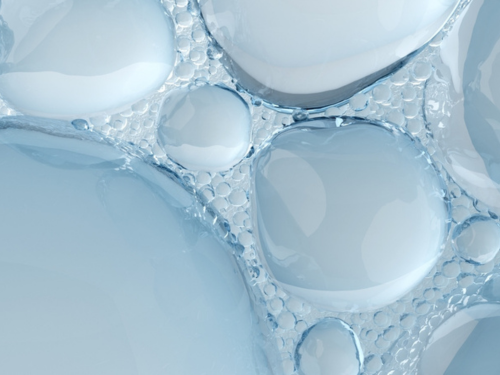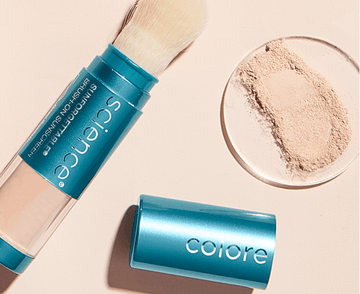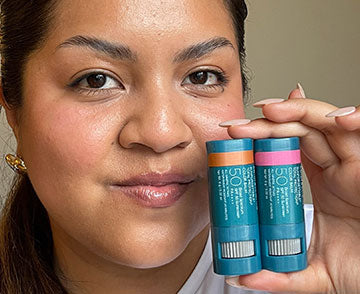
Harmful Ingredients in Sunscreen: Explained
The ingredients in your skincare products can really make or break the overall health and appearance of your skin. Whilst there are some ingredients out there that can make incredible improvements to your skin concerns, there are others that can actually do more harm than good.
Consumers today are more informed than ever thanks to social media, and therefore the demand for clean, ethical skincare has grown exponentially. It is crucial to understand what’s actually inyour products to make sure that you are making the right choices for your skin.
We’re going to explore five common ingredients to avoid in skincare products, and why steering clear of them will be beneficial to your long-term skin health.
Why avoiding harmful ingredients matters
There are some ingredients out there, commonly found in skincare products that can cause irritation and disrupt your skin’s natural barrier. When exposed to these ingredients over a period of time, it can even contribute to long-term chronic skin conditions, which can be difficult to manage. For example, many products contain synthetic chemicals that are used to enhance shelf life, or fragrance additives to improve the sensory experience of the product, however these can actually trigger allergic reactions and clog pores.
Making clean skincare choices not only reduces your risk of skin irritation but also ensures your skin receives the ingredients it actually needs.
Five harmful ingredients to avoid in skincare products
1. Parabens
Parabens are preservatives which are used to prevent mold and bacteria growth within products, and therefore are added to increase the product’s shelf life.
Parabens are harmful, as they can mimic estrogen in the body, and potentially can disrupthormone health. Common types of parabens found in products include methylparaben, ethylparaben, and propylparaben.
Make sure to look for ‘paraben-free’ labels when you are shopping, or if in doubt, check the ingredients list for these hidden chemicals.
2. Sulfates
Sulfates are detergents and foaming agents, which are commonly found in shampoos and cleansers. Examples of sulfates include sodium lauryl sulfate (SLS), which can strip the skin of its natural oils, leading to irritation, dryness and an increase in sensitivity.
3. Artificial fragrances
As the name suggests, artificial fragrances are synthetic compounds used to add scent to skincare products, to enhance the sensory experience for the consumer. Whilst they may make the product smell nice, these fragrances are known to trigger allergies, irritation and sometimes even respiratory issues.
4. Formaldehyde and formaldehyde-releasing agents
Similarly to parabens, these ingredients are preservatives that prevent microbial growth.
Formaldehyde is a known carcinogen and can cause skin irritation and allergic reactions.
5. Mineral oil and petroleum-derived ingredients
These two ingredient types have been gaining a lot of bad press and luckily many consumers are becoming wise to the effects of mineral oil and petroleum-derived ingredients, which are essentially by-products of crude oil, that are used as emollients. Whilst they may be hydrating initially, these ingredients are clog pores, and disrupt your skin’s ability to breathe.
How to identify harmful ingredients in skincare products
- Read labels carefully: Familiarise yourself with the scientific names of the harmful ingredients listed above, and do your research on the product and brand that you are buying. Also, reading up on the brand’s ethos is a good place to start, as many brands who sell “clean” formulas will promote this widely in their brand messaging.
- Avoid products with generic terms: Labels like "fragrance" or "parfum" can hide a number of harmful chemicals.
What to look for in safe skincare products
- Non-toxic and clean formulations: Look for brands committed to transparency and safety, and those that promote that they are ‘paraben-free’. At Colorescience, all of our formulasare 100% paraben free. In addition, all products are also 100% free from phthalates, synthetic fragrance, animal testing, talc, dyes, mineral oils, drying alcohols and chemical sunscreen.
- Natural ingredients: Choose products with plant-based extracts and essential oils over products with added fragrances.
- Dermatologist-approved options: Products tested and recommended by skincare professionals are usually a safe bet. Our product portfolio is trusted by thousands of physicians across the globe.
Harmful Ingredients in Sunscreen Explained
By avoiding products containing some of the harmful ingredients listed above, you can make sure that your skin gets the results you want, without compromising on its health. Take a look at our range of dermatologist-approved mineral sunscreens and our clinically proven treatments.


